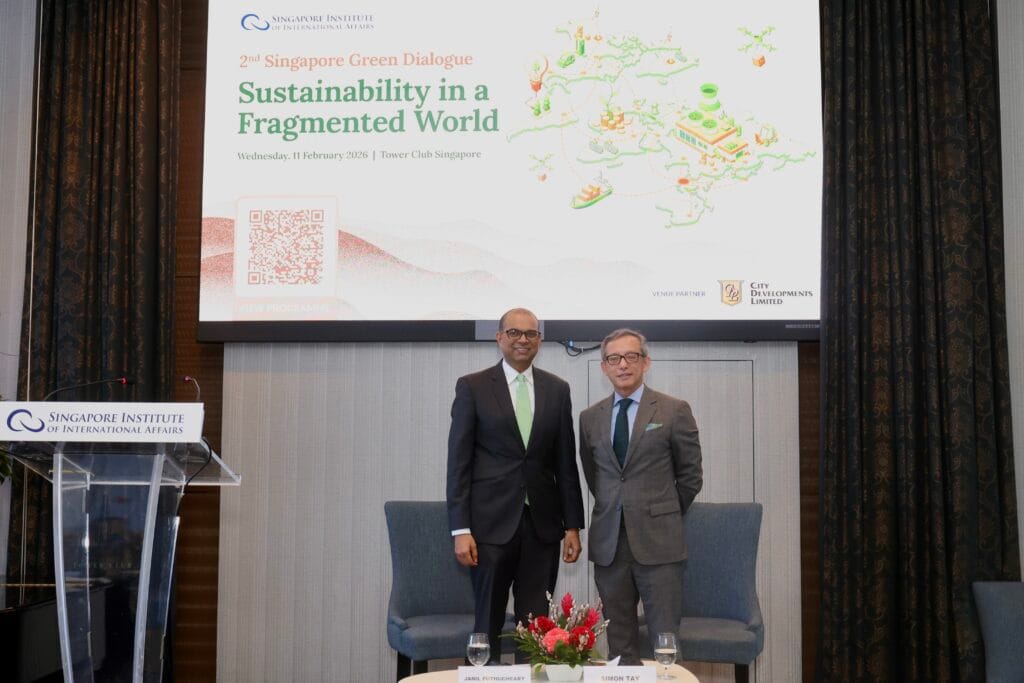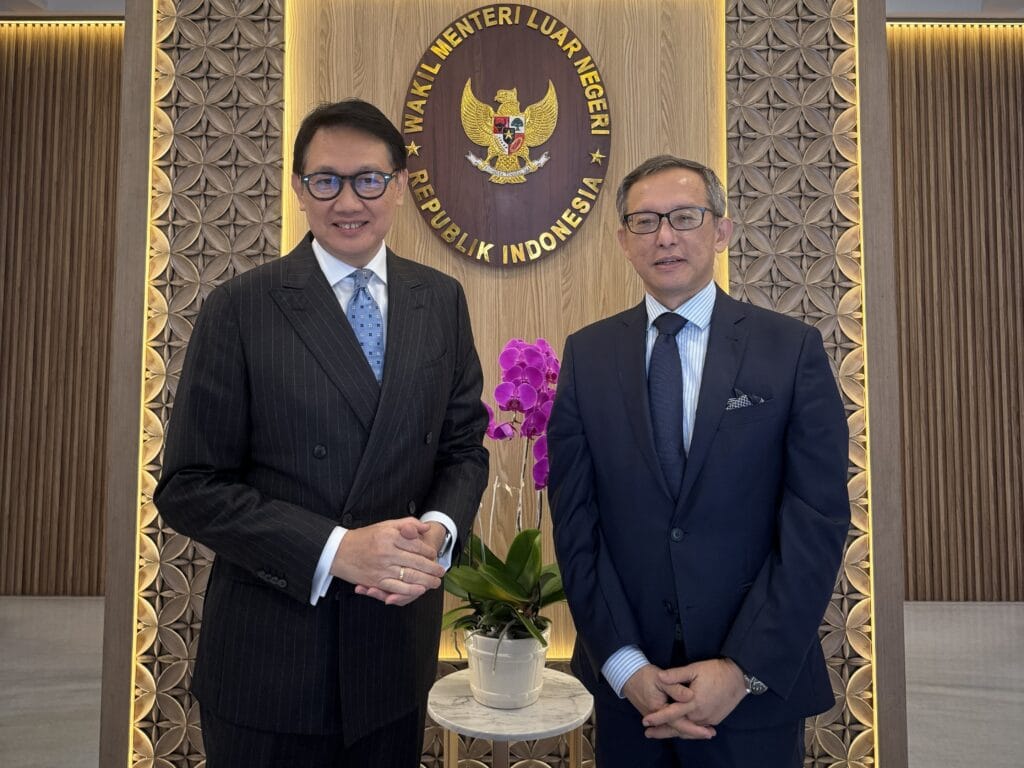Risk of haze and trade frictions should not hold back ASEAN’s green transition
Despite tensions between environmental and economic priorities, experts at the 10th Singapore Dialogue on Sustainable World Resources say potential remains for international cooperation
Singapore, 9 June 2023 – There is a real risk that transboundary haze may return to our region this year. The question is whether this will lead to tensions between countries or opportunities for partnerships for sustainable growth.
This was one of the key observations made at the 10th Singapore Dialogue on Sustainable World Resources (SWR) organised by the Singapore Institute of International Affairs (SIIA).
The 10th edition of the SWR was themed “Inclusive Sustainable Growth” and was held at the Fullerton Hotel in Singapore. The dialogue examined ASEAN’s progress in achieving sustainability within the agribusiness sector and looked at the emerging trends shaping climate action and ESG. The event attracted more than 230 attendees ranging from policymakers, industry experts, corporate leaders and decision-makers worldwide, many of whom were from Indonesia, Malaysia and Singapore.
“In order to have meaningful, impactful, long-lasting collaboration, we need to build trust and confidence among all stakeholders, so that we can better understand and accommodate the differing national contexts. Only then can we forge global and regional agreements that can effectively address a global commons problem,” said Ms. Grace Fu, Minister for Sustainability and Environment, Singapore.
“Singapore appreciates the strong leadership demonstrated by Indonesia as ASEAN Chair. We will work closely with Indonesia at all levels to prevent an outbreak of fires in our region, and stand ready to provide technical support if required,” Ms. Fu added. She noted the need for “knowledge, leadership, and partnership” at the regional level in addressing sustainability challenges.
This is important as agribusiness supply chains in ASEAN are now under greater scrutiny. At the end of June, the European Union is set to finalise a new regulation requiring importers to verify that their supply chains are free from deforestation. On 8 June, Indonesian President Joko Widodo and Malaysian Prime Minister Anwar Ibrahim released a joint statement calling on the EU to “work towards a fair and equitable resolution” with its trade partners on the forthcoming EU deforestation regulation.
Remarking on the tension between environmental protection and economic interests, Associate Professor Simon Tay, Chairman, SIIA said: “This is a current controversy, not only of technical details, but of high politics.” Indonesia and Malaysia dispatched a joint mission to Brussels last week, and Prof Tay expressed hope that all sides will be able to reach an amicable resolution.
The EU’s deforestation regulation is the latest in a series of environmental measures introduced by the grouping. “Climate actions by the international community could also impact Indonesia’s economy and international trade,” said Dr. Musdhalifah Machmud, Deputy Minister for Food and Agribusiness at the Coordinating Ministry for Economic Affairs, Indonesia, highlighting the EU’s recent carbon border adjustment mechanism (CBAM) that became operational last month.
She added that transition risks coupled with a lack of industry preparedness would have negative consequences, particularly for smallholder farmers who will bear the brunt of these shifts unless enough is done to help them build their capacity. Speaking at a 10th SWR panel discussion on sustainability and trade, European Commission and Indonesian officials agreed on the need to ensure that the new law does not damage livelihoods.
Commenting on Sarawak’s efforts to promote sustainable development, Prof. Dato Sri Dr. Sim Kui Hian, Deputy Premier of Sarawak, Malaysia, said, “We want to grow our economy, we want to be socially inclusive so that no one is left behind, it doesn’t matter [your] race or religion, urban or rural, and we’re going to be environmentally sustainable.”
Dr. Sim shared Sarawak’s progress under its Post COVID-19 Development Strategy (PCDS), which includes green pillars on energy, land use, and other areas. He noted that Sarawak’s forestry sector is already net-zero and that the state has recently begun producing sustainable aviation fuel.
Businesses and investors are increasingly interested in biofuels powering the world’s low-carbon transition. But there are concerns about the feedstock demand contributing to more deforestation. Panellists at the 10th SWR agreed on the need to ensure that biofuels development in ASEAN remains sustainable.
Emphasing the important of regional partnership in his keynote speech, Dr. Alue Dohong, Vice Minister for Environment and Forestry, Indonesia said “We are determined to play our part in addressing the global climate crisis and creating a greener, more prosperous world for generations to come. However, we cannot do it alone. There are potential technical collaborations with various partners.”
Indonesia aims to make its forestry and other land use sector (FOLU) a net carbon sink by 2030, and this will be the main driver in achieving Indonesia’s Enhanced Nationally Determined Contribution (NDC) target under the Paris Agreement.
“The region and especially Indonesia have made substantial commitments in their management of resources and land,” said Prof Tay. “Much of this has been done not because of global pressure but because there is a very real demand for sustainability within ASEAN countries themselves. Cooperation and partnership are key responses.”
The 10th SWR was made possible by the following donors:
- Gold donor: RGE
- Donors: MUFG, Temasek Foundation
Photos from the event can be found here.
Media Contact
Ms. Rohini Nambiar
Assistant Director, Policy Programmes and Media
Email: Rohini.nambiar@siiaonline.org; media@siiaonline.org
About the Singapore Institute of International Affairs
Established in 1962, the Singapore Institute of International Affairs (SIIA) is a non-profit and independent think tank committed to producing policy analysis, fostering in-depth dialogues, and bridging gaps between policymakers, private sector decision-makers and experts to shape public policy and social responses. Centred around ASEAN focused themes, the institute aims to deliver policy analysis in regional and international politics, economic policy, and sustainability. We are one of the world’s leading independent think tanks and ranked number one in Asia and the Pacific. Our research and events reach out to policymakers, business leaders, and professionals. Visit us at www.siiaonline.org
About the SIIA’s Sustainability Programme
The SIIA’s Sustainability Programme was established in 1997 when we organised Singapore’s first haze dialogue with the Singapore Environment Council. Since then, the Sustainability Programme has evolved to address a range of climate issues that ASEAN faces. Following the severe transboundary haze in 2013, the SIIA established the Singapore Dialogue on Sustainable World Resources (SWR) in 2014. The dialogue is now into its 10th year. The Programme continues to focus on the forestry sector, as well as the use of finance as a lever to advance supply chain sustainability and drive Southeast Asia’s green recovery from the COVID-19 pandemic and long-term transition




